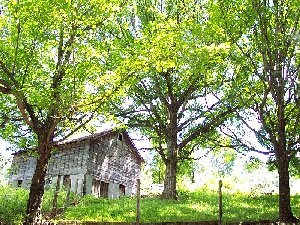
The snow mottled the Nebraska cornfield, a residual pockmark of white here and there contrasting the dull, uninspired rows of pale yellow stubble standing guard past the driveway, the ugly heads of misshapen children. Dreary winds of early March moved itinerant sagebrush slowly across the landscape, catching on stalks from time to time, pieces moving across a chessboard; Knight to Queen’s Bishop 4—checkmate.
Raw, today… Thelma Copeland peered out the peephole windows in the front door, stealthily checking out the porch. From the kitchen, she thought she heard Blackie barking on the front porch of the only home she’d ever known, so she’d made her way into the front room to investigate. Thelma’s husband, Luther Ray Copeland, had moved in the day after their wedding in the spring of 1918, the family farm a wedding present from Thelma’s father. Forty-eight years had passed and their ever-expanding family, seven children still living and grandchildren almost too numerous to count, had long since gone, but it was still home and it was all she wanted or needed. She glanced at the Co-Op calendar hung on the wall below the Crucifix. Below the photo of a tropical island cabana complete with palm tree, the words March 1965 jumped off the page and into her mind; an unnecessary reminder that time had become her enemy. Blackie’s harsh, dry, incessant yelps forced her back into the present. No one was visible on the porch, so she opened the door and surveyed the area visible through the screen door, the frosty breeze nipping at her bare arms.
A black Chevy sedan sat parked in their driveway, a four-door model unadorned except for the white markings painted on the front door, the ubiquitous seal of the great State of Nebraska. Seeing no one, she quickly made her way to the stairwell and opened the door to the cellar. “Bill… come upstairs, quick! We’ve got visitors!”
Luther Ray “Bill” Copeland bounded up the stairs, three at a time, the urgent tenor of his wife’s voice compelling him to hurry. Without speaking, he stepped into the mudroom adjacent to the kitchen and grabbed his hat and coat, quickly throwing his arms into the jacket and buttoning it up. “I already know who it is. They were in the south field yesterday. I’ll handle it, you just stay here.”
“But, I don’—“ As she stared at Bill’s large backside, she heard the back door slam shut. Thelma sighed deeply and walked back to her old wood stove, grabbing a kitchen towel along the way. Her bread needed to be checked, and as she opened the oven door, the cold fear emanating from her forehead evaporated in the welcome heat and aroma of baked goods.
********
“I thought I told you, I ain’t interested in selling my property.” Luther Copeland towered over the two smallish men, and although his hands were still sequestered in his coat pocket, his imposing posture left no doubt that he was not happy to see them.
The two officials from the Nebraska Highway Department glanced at each other briefly, deciding who would speak. “Well, Mr. Copeland,” the taller of the two offered, pulling his jacket collar up to cover his neck, “it’s gone beyond the point where there’ll be a sale, I’m afraid.”
“Fellas, you don’t seem to understand, I’ve lived on this land for nearly fifty years, and there ain’t no two government men going to make me leave. So unless you want the shit kicked out of you this morning, I suggest you get back in your fancy car and off my property.”
Resignedly, the tall man reached into his pocket and pulled out a blue-covered court document and handed it to Luther. “This here is a court order, Mr. Copeland. You have been ordered to vacate this property within thirty days. Your land has been condemned and will be sold at public auction, the proceeds of which will be credited to your account at the Gibbon Savings Bank. The U.S. government has dictated where the new freeway will be built, and has given us no discretion to change it. Since you refused to sell us an easement through your property, we were left with no choice except to take this action.”
Luther Copeland took the papers from the man and without stopping to read a single word, threw the document onto the ground at his feet. Then, without further hesitation, inhaled deeply, causing phlegm to pass from his nose into his throat, which he spit onto the papers. Rubbing his foot into them animatedly, he stared at the men. “This is what I think of your court order. Now get the hell off my property.”
Throwing up both hands in obeisance to Luther’s physical superiority, the men stepped towards their car. As the leader grabbed the door handle, he adjusted his glasses and paused to speak. “Okay, we’ll leave, I know better than to start trouble with you, but others will be back, I assure you. For whatever it’s worth, please know that I take no pleasure in this… I’m truly sorry.”
“Sorry’s ass… tell the sheriff that if he sends any more people out here, he better send body bags with them, because as of this moment, any son of a bitch that steps onto my property uninvited will need it. Today’s free, gents, but the next time won’t be.”
With that, Luther walked away at his slow loping pace, his eyes never once leaving the car with the seal of the great State of Nebraska inscribed on the door. Once it had cleared his property, Luther Copeland stepped back inside his house and calmly hung his coat and hat on the hook in the mudroom designated for that purpose. The scent of the freshly-baked bread cooling on the counter soothed him and reminded him of times when his children would have gotten their hands slapped for attempting to fondle it. Breaking off a hunk from the end, he popped it into his mouth without the enhancement of butter or jelly; Thelma’s bread simply didn’t need it.
********
The second week of May 1965, Thelma Copeland heard a knock at her front door at 128 5th Street, Kearney, Nebraska, where she now resided with her husband, Luther Ray. The smiling postman offered her a crisp, white envelope with her name and address in elegant, machine-printed lettering. One quick flick of a finger ripped the upper edge neatly, revealing an equally elegant, gold-embossed card requesting their presence at the high school graduation ceremonies of her grandson, Bobby Ray, in Aurora, Colorado.
What she couldn’t have known is that despite the joy she currently felt while thinking about the lad’s accomplishments, she wouldn’t be able to attend. Indeed, neither would Bobby Ray’s mother, Thelma’s daughter Betty, because another engagement would command their presence. What she also couldn’t have known is that her husband, Luther Ray, would die of a heart attack on June the 6th , precisely three days before the planned graduation.
The coroner’s report would list cardiac arrest as the cause of Luther Ray’s death, brought about by advanced diabetes. However, nothing on earth could have convinced Thelma Mae Copeland that the State of Nebraska didn’t murder her husband, a man who simply wasn’t cut out to live in town.





2 comments:
Oh my God !
This is outstanding.
THe heartbreak of lossing
something that is a much
a part of you as your
hair or hands is
laid out for us
to bring into our
hearts and soul.
The fear of haveing
something/someone
taking control
of your life is shown
to us in this short
story.
Job really well done.
my friend, really will done!
Thanks so much, Kay lee. It's really the only way I have left of paying tribute to my grandfather.
Post a Comment